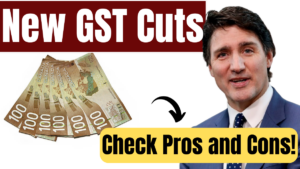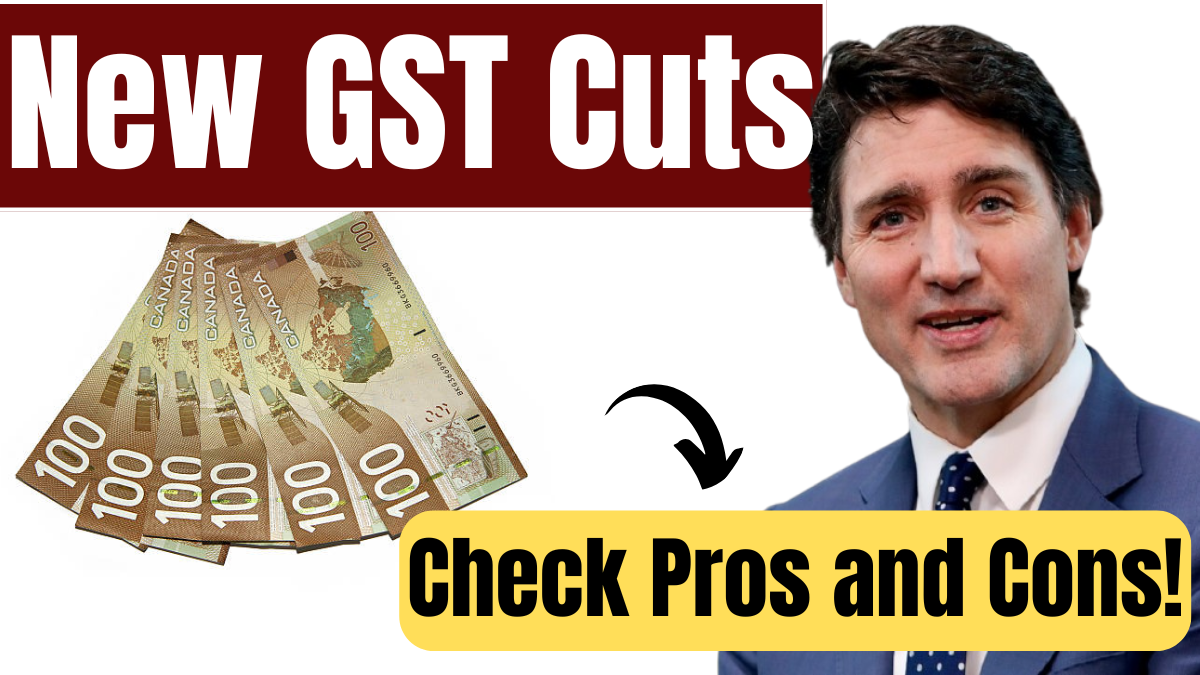As inflation continues to affect daily budgets, Canadians are set to benefit from a two-month GST holiday introduced by Prime Minister Justin Trudeau. The temporary reduction in the Goods and Services Tax (GST) aims to lower household costs during one of the year’s busiest shopping seasons.
This initiative will run from December 14, 2025, to February 15, 2026, offering consumers a break on taxes for selected items. In this article, we break down what’s included, the benefits for Canadians, and why some experts remain cautious about this short-term solution.

What Are the New GST Cuts?
Prime Minister Trudeau’s announcement brings a two-month GST and HST exemption on various essential and holiday-related goods. Canadians will enjoy tax-free shopping on groceries, snacks, children’s clothing, and selected beverages. The move is expected to ease holiday spending pressures while stimulating consumer activity.
This GST cut is paired with an additional benefit—$250 cheques to be issued to over 18 million Canadians earning under $150,000 annually.
Timeline and Scope of the Tax Holiday
| Details | Information |
|---|---|
| Announced By | PM Justin Trudeau |
| GST Cut Period | 2 Months |
| Effective Dates | December 14, 2025 – February 15, 2026 |
| Eligible Residents | Canadians earning below $150,000 annually |
| Additional Support | $250 cheque for eligible individuals |
What Items Are Exempt Under the GST Cuts?
The temporary GST relief covers both necessities and non-essential goods, including:
-
Baked items and snacks
-
Ready-to-eat meals
-
Beverages such as soft drinks and select alcohol (e.g., beer, cider, pre-mixed drinks)
-
Children’s winterwear and footwear
-
Diapers and baby care products
However, certain items remain taxable:
-
Strong alcoholic beverages (above 7% alcohol content)
-
Specialty wines and spirits
-
Recreational clothing for children like sports costumes
Pros of Trudeau’s GST Tax Holiday
Many Canadians have welcomed this initiative, particularly due to its timing. The holiday season often puts financial pressure on households, and the GST relief is seen as a timely aid.
Key advantages include:
-
Families can save significantly on essentials and gifts during peak shopping months
-
The CRA estimates the total public savings to be around $1.6 billion
-
It sets a precedent for future financial relief measures
-
Aids low- and middle-income households struggling with day-to-day expenses
This temporary GST exemption serves as a way to reallocate funds toward other necessary expenses during high inflation periods.
Cons of Trudeau’s GST Cut Strategy
Despite its popularity, several critics and economists have raised concerns:
-
It is viewed by some as a pre-election strategy rather than long-term policy
-
Critics argue that it fails to address core economic problems, acting only as a short-term fix
-
Some economists warn it could shift the tax burden into future periods
-
There are concerns over whether it incentivizes real economic growth
For many, the tax holiday provides momentary relief but does not tackle the deeper financial difficulties Canadians face year-round.
Final Thoughts
The New GST Cuts in Canada bring momentary ease for consumers amid rising living expenses. While many welcome the policy as a practical holiday-season benefit, there’s an ongoing debate over whether short-term measures like this can address long-term economic challenges.
Trudeau’s administration aims to show responsiveness to inflation and rising costs. However, many Canadians are looking for sustainable, long-term solutions to income support and tax reform. The coming months will reveal whether this initiative leads to more comprehensive policy changes or remains a seasonal relief.
FAQs
What are the dates for the GST cuts in Canada?
The GST holiday runs from December 14, 2025, to February 15, 2026, allowing Canadians to buy select goods tax-free.
Which items are included in the GST exemption?
GST is waived on groceries, baked goods, soft drinks, ready-made meals, diapers, baby products, and children’s winterwear. Alcoholic drinks above 7% alcohol remain taxable.
Who will receive the $250 support cheque?
Over 18 million Canadians with annual incomes under $150,000 are eligible to receive the one-time $250 benefit.
Will I need to apply for this GST cut or cheque?
No application is needed. The GST cut applies automatically at the point of sale, and CRA will distribute the $250 cheque to eligible individuals based on tax records.
Is this GST cut permanent?
No, the current plan is for a temporary two-month tax holiday. It may or may not be extended based on further policy decisions.
Click here to learn more.
Aanchal is a passionate writer with a keen interest in storytelling, content creation, and creative expression. She enjoys exploring diverse topics and crafting engaging narratives that captivate readers.

